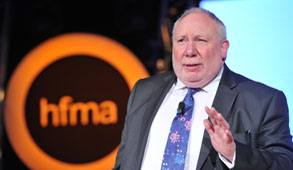HFMA 2017: Good financial progress, but more to be done
Mr Alexander (pictured) thanked the finance community for the work they had done in recent years to deliver financial plans and positions that enabled the best possible services to be delivered to local populations. More patients had been treated than in previous years, cost improvements were higher year-on-year and the service as a whole was demonstrating greater productivity than the rest of the economy.
But he warned that there was still more that could be done and issues that needed to be addressed.
‘There is still a significant reliance on non-recurrent measures and many financial improvements are skewed to the back end of the year,’ he said. The increased funding announced in the Budget, while falling short of what commentators have claimed is needed, gave genuine cause for hope, he said – recognising that the service needed clarity about how the extra funding will flow and what expectations will come with it.
Mr Alexander, making his last annual conference speech before taking up a sustainability and transformation partnership role, said it was important that local organisations and economies addressed the risks in their positions for the remainder of the year.
‘Some of the risks will be assisted by this year’s revenue injection, but not all,’ he said. ‘You know the risks only you in your organisations can deal with. And don’t let the system risks – the issues between organisations – hang in the air. Be open. Continue to be professional in your conversations and dealings. And demonstrate the collaboration and partnership that underpin effective system working.’
He reminded delegates that he had spoken at previous events about the need to see the re-emergence of financial management and discipline alongside a focus on safety and quality. ‘It feels that the corner has been turned,’ he said. ‘The scrutiny of productivity, the increased mainstreaming of RightCare and the Getting it right first time initiatives and the introduction of use of resources and well-led assessments – all support the sustainability of that re-emergence.
‘So in many ways, as daunting as the challenge ahead is, this remains a fantastic opportunity for the finance profession to showcase its value at the heart of improving our NHS,’ he told the conference. ‘Our proven analytical and decision support skills. Our professional and ethical way of doing business. How we operate peer to peer across systems. And our innovation and creativity always grounded in the reality of understanding resource availability and the financial impact of what we are changing.’
He said this raised questions about the best way to support and provide development opportunities for finance staff. To support this, he said system leaders would shortly be inviting nominations for the second cohort of the national talent pool for aspiring senior finance leaders. Finance talent networks would also be set up for those who see themselves in senior finance roles in three to four years’ time.
Related content
The value masterclass shares examples of organisations and systems that have pursued a value-driven approach and the results they have achieved.
This webinar series offers colleagues of ICS organisations the opportunity to discuss common priorities, challenges, and successes within their field.